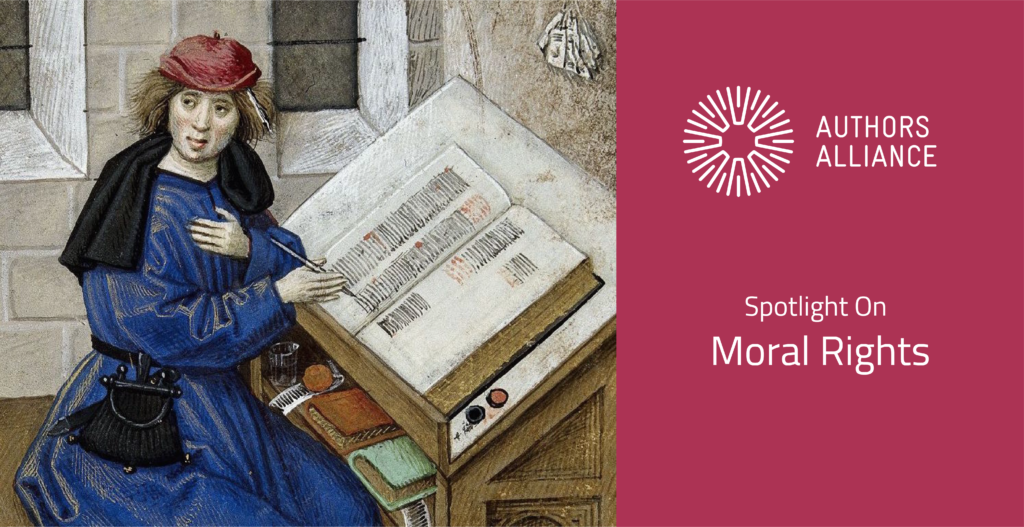
“Author from BL Harley 4425, f. 133” by Guillaume de Lorris and Jean de Meun is licensed under PDM 1.0
Since our launch, Authors Alliance has endorsed the idea that Congress should extend statutory protections for attribution (the right of an author to be credited as the author of his or her work) and integrity (the right of an author to prevent prejudicial distortions of the work) as part of its copyright reform initiatives. In our Principles and Proposals for Copyright Reform, we wrote that the “law should recognize the right of authors to be acknowledged as creators of our works.”
Last week, Authors Alliance President Pamela Samuelson identified eight reasons why it is in the interest of authors as well as the public for authorial attribution and integrity to be statutorily recognized in U.S. copyright law. In this second post in our series on moral rights, we set out some additional contours for the scope of these rights.
Limitations and Exceptions
To prevent attribution and integrity rights from stifling onward creativity and speech, these rights should be carefully cabined through limitations and exceptions. Three of these limitations and exceptions are fair use, first sale, and “reasonableness.”
Fair Use
Authors Alliance recommends statutory recognition of fair use as a limitation on non-economic authorial rights. A follow-on creator who parodies a well-known popular song, such as the 2 Live Crew parody of Roy Orbison’s “Pretty Woman,” should, for example, be able to avoid liability for violating attribution and integrity rights by raising a fair use defense. Critically, attribution and integrity rights should not constrain the ability of others to speak about an author or a work.
First Sale
Authors Alliance supports a first sale exception to attribution and integrity rights to allow for the modification of lawfully acquired works (outside of works covered by the Visual Artists Rights Act). For example, owners of copies of copyrighted toys, among other works, should be able to engage in playful acts, such as deconstructing, reassembling, and combining new elements into a new toy for the owners’ private enjoyment or creative reuse, without fearing that the author of the toy could challenge this creative reuse as a violation of integrity rights.
“Reasonableness”
A robust “reasonableness” limitation on integrity and attribution rights should also be in place. If it is reasonable, given the circumstance, to distort the work or not to identify the author, there should be no infringement of the right of integrity or attribution. For example, in some situations, it may not be feasible to provide attribution (e.g., in the midst of a lecture or performance), and some works by popular authors (e.g., Dr. Seuss) are so well-known or familiar to their audience (e.g., on a Harry Potter fan fiction site) that they are self-attributing.
Remedies
In addition to providing for limitations and exceptions to the application of integrity and attribution rights, potential harm to speech interests can be mitigated by providing for remedies that are tailored to remedy the harm caused to the affected author’s interest. Given the non-economic nature of violations of attribution and integrity rights, monetary damages should be avoided in favor of injunctive relief. For example, in the event of a failure to attribute, a remedy compelling the inclusion of the author’s name in subsequent distributions of the work would address the harm to the author’s attribution right. Similarly, in the case of integrity rights, relief may take the form of requiring that the modified work be accompanied by a disclaimer that communicates the author’s objection and the nature of the modifications to the original work.
Authors Alliance strongly discourages providing statutory damages for violations of attribution or integrity rights. Given the lack of principles for making statutory damages consistent and just in the copyright infringement context, and given that the nature of the harm for a violation of attribution and integrity rights is generally non-economic, statutory damages should not be available for violations of non-economic author rights.
Duration
Authors Alliance believes in the importance of a healthy public domain and supports the public’s right to freely use works that have entered into it. To avoid obstructing the public domain’s vitality, limits on the duration of non-economic author rights should be in place. The duration of non-economic author rights should be no longer than the length of copyright protection (whether the copyright expires or the copyright owner releases the work to the public domain). In fact, since the rationales for statutory recognition of rights of attribution and integrity are strongest when those rights are asserted by living authors, it would be appropriate for those rights to be non-transferable and last only until the author’s death.
We want to hear from you! Please use the comment field below to share your thoughts on moral rights.
